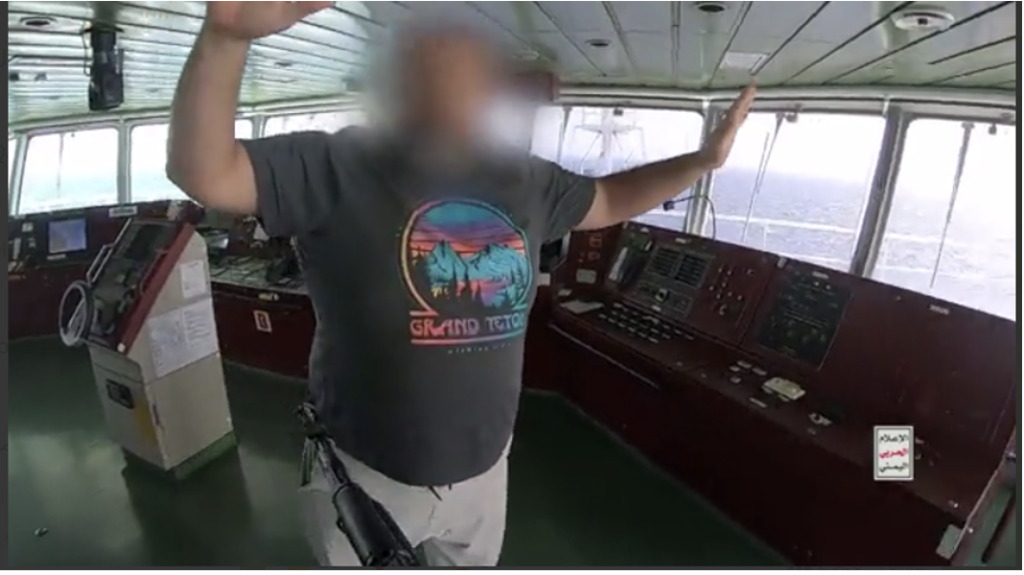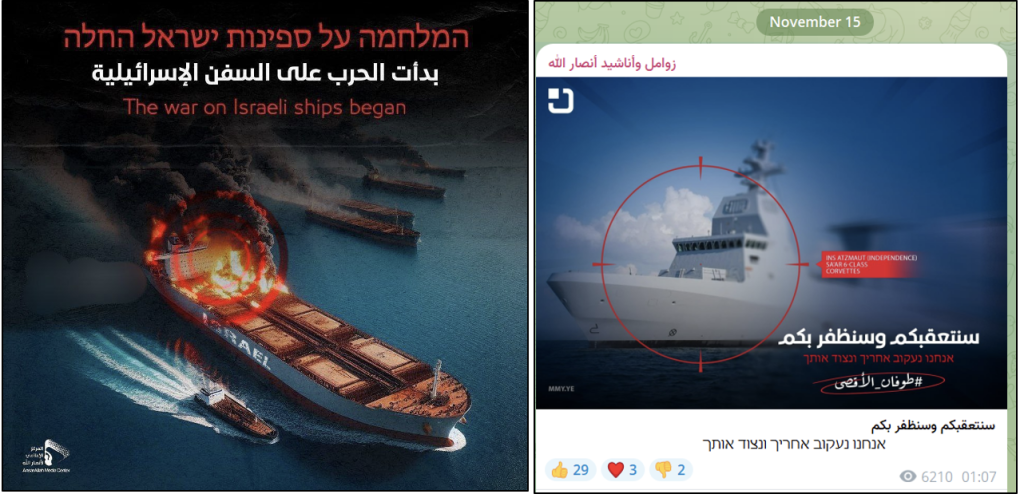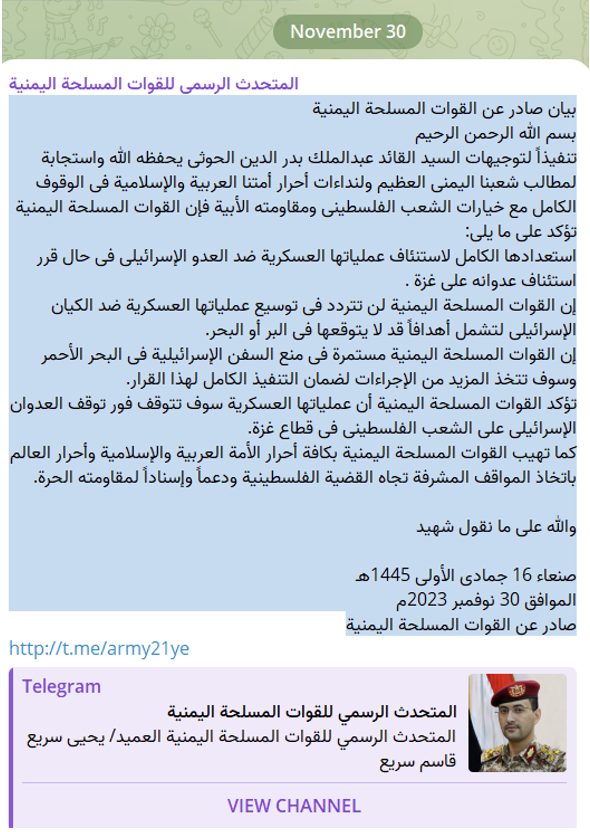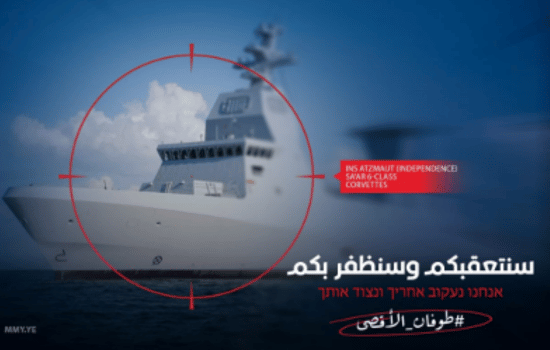The Threat to Maritime Security in the Red Sea
In recent weeks, there has been a notable increase in terrorist activities within maritime spaces. Among others, on December 6, the British Maritime Trade Operations (UKMTO) reported an incident involving unmanned aerial vehicles (UAVs) west of Port Hodeidah in Yemen.[1] On December 3rd, UKMTO reported another incident involving UAVs from Yemen, which potentially caused an explosion near the Bab-el-Mandeb Strait.[2]According to reports, ships “suspected to be Israeli” were attacked by surface-to-sea missiles and UAVs in the Red Sea. One ship suffered minor damage, while a British vessel incurred significant damage and was at risk of sinking.[3] On the same day, an American warship in the Red Sea area neutralized three approaching UAVs.[4] The Houthi rebels from Yemen claimed responsibility for these attacks, with their spokesperson threatening Israel and the USA, which are engaged in the conflict in Gaza against the Palestinians.[5]
Additional incidents were recorded on November 27th, when an American warship freed a commercial vessel (linked to Israel) that had been hijacked off the coast of Yemen. During the confrontation, missiles were fired at the American destroyer, but no damage or casualties occurred.[6] On November 24th, an Israeli-owned cargo ship in the Indian Ocean was attacked by an Iranian suicide drone, causing damage but no crew casualties.[7]Less than a week earlier (on November 19th), Houthi terrorists seized a cargo ship in the Red Sea, mistakenly claiming it was Israeli. Footage from the takeover showed Houthi forces disembarking from a helicopter and threatening the crew.[8]

Since the outbreak of the Hamas-Israel war, the Houthis have repeatedly threatened to target Israeli-owned ships or those flying the Israeli flag. For example, Hezam Al-Asad, a member of the Houthi Political Bureau in Yemen, wrote in Hebrew on his ‘X’ account (former Twitter): “As long as they persist in their aggression against our people in Gaza, they must navigate the route of the Cape of Good Hope.”[9] This implies the need for ships to circumnavigate Africa to reach the Gulf of Eilat or exit the Red Sea into the Indian Ocean via the Cape of Good Hope, located in southwest Africa.
Additional publications on the Houthis’ Telegram channels, some in Hebrew, also threaten Israeli ships. In response to these events, the Zim shipping company announced changes to its sailing routes, extending the journey from the Far East to Israel by two to three weeks.[10]
On November 30th, during the week-long ceasefire in Gaza (which lasted from November 24th to December 1st), the Houthis announced their readiness to renew military action against Israel if it resumed the operation in Gaza. They stated that their armed forces would not hesitate to expand their activities against land and sea targets and continue to block Israeli ships in the Red Sea. The announcement concluded with a vow to continue operations against Israel until aggression against the Palestinian people in the Gaza Strip ceased, along with a call to support the Palestinian cause and resistance. It is clear that the Houthis not only express motivation to operate in the maritime domain, as stated in their terror organization’s declarations, but also demonstrate their capability.


The Red Sea constitutes one of the most significant maritime routes in the world, serving as the vital link between the Far East, the Mediterranean, and Europe via the Suez Canal. The recent activities recorded in this region, coupled with the presence of the Houthis, Iran’s proxies, in the Bab-el-Mandeb Strait, have impacted the security of these maritime routes, as well as the global economy. This development has transformed the maritime domain into an arena of conflict.
In response to the recent events, the IDF spokesperson, Brig. Gen. Daniel Hagari, stated: “This is a case of negative subversion by the Houthis. It is essential to understand that the weaponry used by the Houthis for these operations is Iranian, as are the intelligence, methods, and capabilities. This demonstrates Iran’s negative interference in the region, which is a global problem, and we need to see how the world responds to this threat.”[11] The Houthis are part of Iran’s proxy network, advancing Iranian interests in the Middle East. Over the years, Iranian involvement and support for the Houthi forces have significantly increased, including funding, weaponry, training, and more.
Several potential scenarios for activity in the maritime domain can be envisaged:
- Attacks on strategic targets such as oil platforms
- Assaults on naval security forces or coastal attacks via the sea
- Interference with maritime trade routes
- Attacks on civilian vessels, etc.
It should be noted that the maritime domain is also used for smuggling people and arms, and there have been attempts to seize both military[12] and civilian vessels, blurring the distinction between terrorist and criminal activities.
In light of this, it is advisable to enhance international cooperation in the maritime domain to maintain maritime security, through joint naval exercises, intelligence sharing, technological collaboration and more.
[1] https://x.com/UK_MTO/status/1732343911316598855?s=20
[2] https://www.ukmto.org/indian-ocean/recent-incidents#
[3] https://www.telegraph.co.uk/world-news/2023/12/03/uk-owned-ship-hit-rocket-fire-yemen-red-sea-drone/
[4] https://apnews.com/article/red-sea-houthi-yemen-ships-attack-israel-hamas-war-gaza-strip-716770f0a780160e9abed98d3c48fbde
[5] https://english.almayadeen.net/news/politics/yemen-will-resume-operations-against–israel–in-support-of
[6] https://www.i24news.tv/en/news/israel-at-war/1701062337-houthis-fire-ballistic-missiles-toward-u-s-destroyer-rescuing-israeli-owned-ship
[7] https://www.jpost.com/breaking-news/article-775041
[8] https://www.timesofisrael.com/liveblog_entry/idf-confirms-houthis-hijacked-ship-in-red-sea-says-it-is-not-an-israeli-vessel/
[9] https://x.com/hezamalasad/status/1726247021005205663?s=20
[10] https://www.themarker.com/markets/2023-11-28/ty-article/0000018c-1541-dd03-a7ff-bf7924790000
[11] https://www.idf.il/158817
[12] On November 12, 2014, in a precedent-setting incident, an Egyptian navy ship was attacked by a force affiliated with the Islamic State terrorist organization.






